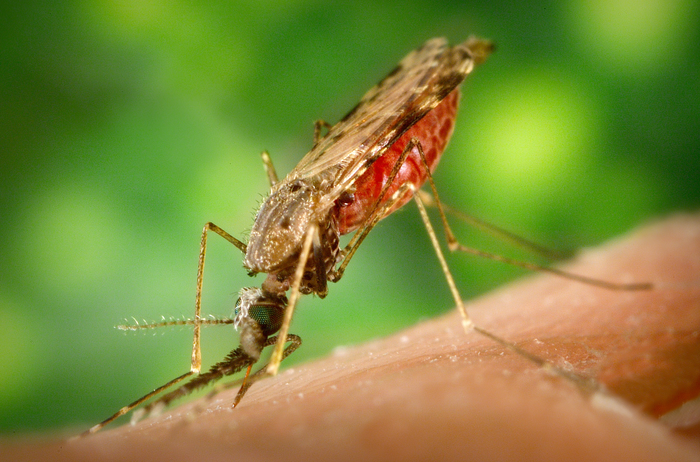WASHINGTON —Geoengineering the climate would have massive repercussions for the health of billions of people at risk of malaria who live in tropical countries, according to a new finding by scientists at Georgetown University Medical Center and colleagues. The study appeared April 20, 2022, in Nature Communications.

Credit: Centers for Disease Control and Prevention
WASHINGTON —Geoengineering the climate would have massive repercussions for the health of billions of people at risk of malaria who live in tropical countries, according to a new finding by scientists at Georgetown University Medical Center and colleagues. The study appeared April 20, 2022, in Nature Communications.
This is the first assessment of how geoengineering the climate could impact the burden of infectious diseases. The study focuses on solar radiation management (SRM), an intervention that hypothesizes emergency actions aimed at reducing dangerous impacts of climate change. One action that has been proposed is injecting aerosols into the stratosphere that reflect incoming sunlight, thereby temporarily “pausing” global warming. Though SRM is often discussed as a way to reduce climate injustice, its potential impacts on health have seldom been studied.
“The implications of the study for decision-making are significant,” says Colin Carlson, PhD, an assistant research professor at the Center for Global Health Science and Security at Georgetown University Medical Center and lead author of the study. “Geoengineering might save lives, but the assumption that it will do so equally for everyone might leave some countries at a disadvantage when it comes time to make decisions. If geoengineering is about protecting populations on the frontlines of climate change, we should be able to add up the risks and benefits — especially in terms of neglected health burdens, such as mosquito-borne disease.”
A team of eight researchers from the United States, Bangladesh, South Africa, and Germany used climate models to simulate what malaria transmission could look like in two future scenarios, with medium or high levels of global warming, with and without geoengineering. The models identify which temperatures are most conducive for transmission by the Anopheles mosquito and identify how many people live in areas where transmission is possible.
In both medium- and high-warming scenarios, malaria risk was predicted to shift significantly between regions; but in the high warming scenario, simulations found that a billion extra people were at risk of malaria in the geoengineered world.
“On a planet that’s too hot for humans, it also gets too hot for the malaria parasite,” says Carlson. “Cooling the planet might be an emergency option to save lives, but it would also reverse course on those declines.”
The study follows a 2018 commentary in Nature Climate Change by Carlson and the study’s senior author, Christopher Trisos, PhD, a senior researcher at the University of Cape Town in South Africa. In the commentary, the researchers proposed a hypothesis now confirmed in the new study: because malaria transmission peaks at 25°C, cooling the tropics using geoengineering might ultimately increase malaria risk in some places relative to an alternative future, but might also increase risk in the present day.
“The potential for geoengineering to reduce risks from climate change remains poorly understood, and it could introduce a range of new risks to people and ecosystems,” says Trisos.
Carlson says that one of the most surprising findings was the scale of potential trade-offs between regions. For example, in both scenarios, the authors found that geoengineering might substantially reduce malaria risk in the Indian subcontinent even compared to the present day. However, that protective effect would be offset with an increase in risk in southeast Asia. For decision-makers, this might complicate the geopolitical reality of climate intervention.
“We’re so early in this process that the conversation is still about increasing Global South leadership in geoengineering research. Our study highlights that the frontlines of climate injustice aren’t one monolithic bloc, especially when it comes to health,” says Carlson.
###
Additional study authors also included collaborators from the University of Maryland, College Park; the International Centre for Diarrhoeal Disease Research, Bangladesh; the University of Florida, Gainesville; the Cologne University of Applied Sciences, Germany; and Rutgers University, New Brunswick, New Jersey.
The authors report having no personal financial interests related to the study. Funding for the study was provided by the Solar Radiation Management Governance Initiative (SRMGI) Developing Country Impacts Modeling Analysis for Solar Radiation Management (DECIMALS) grant program.
About Georgetown University Medical Center
As a top academic health and science center, Georgetown University Medical Center provides, in a synergistic fashion, excellence in education — training physicians, nurses, health administrators and other health professionals, as well as biomedical scientists — and cutting-edge interdisciplinary research collaboration, enhancing our basic science and translational biomedical research capacity in order to improve human health. Patient care, clinical research and education is conducted with our academic health system partner, MedStar Health. GUMC’s mission is carried out with a strong emphasis on social justice and a dedication to the Catholic, Jesuit principle of cura personalis — or “care of the whole person.” GUMC comprises the School of Medicine, the School of Nursing & Health Studies, Biomedical Graduate Education, and Georgetown Lombardi Comprehensive Cancer Center. Designated by the Carnegie Foundation as a doctoral university with “very high research activity,” Georgetown is home to a Clinical and Translational Science Award from the National Institutes of Health, and a Comprehensive Cancer Center designation from the National Cancer Institute. Connect with GUMC on Facebook (Facebook.com/GUMCUpdate) and on Twitter (@gumedcenter).
Journal
Nature Communications
Method of Research
Computational simulation/modeling
Subject of Research
People
Article Title
Solar Geongineering could redistribute malaria risk in developing countries
Article Publication Date
20-Apr-2022
COI Statement
The authors report having no personal financial interests related to the study




